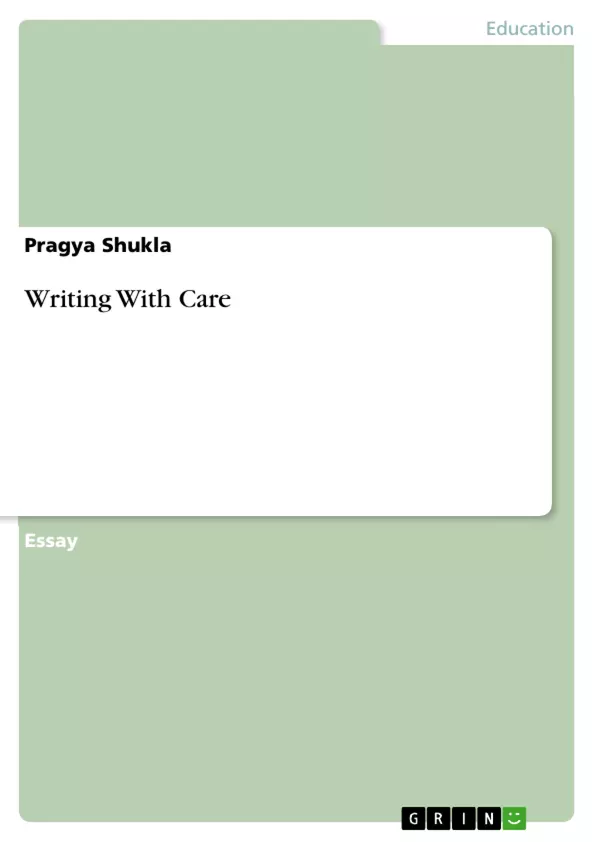to learn wisdom, guides us when we are happy or sad. (1) Book reading leaves an indelible impression upon the minds of the readers. It helps to shape our professional and personal life. There is at least one crucial book in every reader’s list that helps to shape them.
E.M Foster’s A Passage to India led Wendy Doniger to study Sanskrit at Harvard and become the President of the Association for Asian Studies—and also reconnected her unexpectedly to her own Jewish roots. After reading The Secret Garden Christine A Jenkins switched from being a children’s librarian to seek out gay/lesbian literature for the young readers.
Susan Lohafer asserts: “A story creates a small world, a fake world, a tragic or a crazy one: it may be familiar, bizarre, tangible, abstract, reported or dreamed. It may be but the weirdest fragment, yet it will cast a rounded shadow on our minds...” (2)
Understanding the impact of reading on the mind of the reader, writing for children becomes a very difficult task. Only those who have been interested in the education of a family, who have patiently followed children in their various phases of reasoning, who have regularly studied their thought process and feelings—those who understand with what ease and rapidity the early association of ideas are formed are eligible to take up the Himalayan task. The authors must understand that the reading of their text will help in the development of the future taste, character and happiness. They must beware and acknowledge the dangers and difficulties of such an undertaking.
Award winning children’s writer Katherine Paterson states in a State of Wonder, her fascinating book on writing for children. “Mythology and fairy tales deal directly with archetypes...they help children...to face and conquer their inner dragons.”(3)
Parents of children are always very careful of not exposing the young minds to vice. It is however best that they receive an early shock with the representation of what they are to avoid. There is always a big gap between innocence and ignorance. This can be done effectively through stories. But then the exposure has to be tempered—calculated. To prevent the ideas of morality and of triumph of good over evil from tiring the ear and the mind, it is essential to make the stories dramatic, to keep alive hope, fear and curiousity.But the authors must keep from exhibiting false hopes which can never be realized.
Inhaltsverzeichnis (Table of Contents)
- Writing With Care
- The Impact of Reading on Children
- The Role of Fantasy in Children's Literature
- Fairy Tales and Gender Roles
- The Cinderella Complex
- Indian Folklore and Moral Values
Zielsetzung und Themenschwerpunkte (Objectives and Key Themes)
This text explores the impact of children's literature on young readers' development, particularly focusing on the ways in which fairy tales and other stories shape their understanding of gender, morality, and the world around them.
- The importance of parental guidance in children's reading
- The role of fantasy in shaping children's imaginations and perceptions
- The portrayal of gender roles in fairy tales and their potential impact on young readers
- The dangers of perpetuating unrealistic expectations and the Cinderella complex
- The value of traditional Indian folklore in promoting intellectual and moral development
Zusammenfassung der Kapitel (Chapter Summaries)
The text begins by discussing the profound influence of reading on children's personal and professional lives, highlighting the importance of choosing books that foster positive development. It then explores the complexities of writing for children, emphasizing the responsibility authors have in shaping young minds and the need to balance imaginative storytelling with real-world truths.
The text continues by examining the role of fantasy in children's literature, analyzing how fairy tales and other stories can influence children's understanding of gender roles and societal expectations. It specifically focuses on the harmful stereotypes often portrayed in classic fairy tales like Cinderella, which can perpetuate the Cinderella complex, a belief that suffering will eventually lead to reward.
Finally, the text highlights the rich tradition of Indian folklore, which has long aimed to foster both intellectual and moral growth in children. The author draws on the example of Vishnusharman and his five books of fables, illustrating how stories can effectively impart valuable lessons and shape young minds.
Schlüsselwörter (Keywords)
Children's literature, fairy tales, gender roles, parental guidance, fantasy, Cinderella complex, Indian folklore, moral values, intellectual development.
Frequently Asked Questions
What is the impact of reading on a child's development?
Reading leaves an indelible impression on young minds, helping to shape their professional and personal lives, as well as their future taste, character, and happiness.
What are the dangers of gender stereotypes in classic fairy tales?
Classic tales like Cinderella can perpetuate harmful stereotypes and the "Cinderella complex," where children are led to believe that passive suffering will eventually lead to a magical reward.
How does fantasy help children face real-world challenges?
Fantasy and mythology deal with archetypes that help children face and conquer their "inner dragons," providing a safe space to process complex emotions and morality.
What is the responsibility of authors writing for children?
Authors must understand child psychology and reasoning. They have a duty to balance imaginative storytelling with moral truths without creating false, unrealizable hopes.
What value does Indian folklore offer to young readers?
Traditional Indian folklore, such as the fables of Vishnusharman, aims to foster both intellectual and moral growth through dramatic and engaging stories.
- Quote paper
- Pragya Shukla (Author), 2011, Writing With Care, Munich, GRIN Verlag, https://www.grin.com/document/181121



